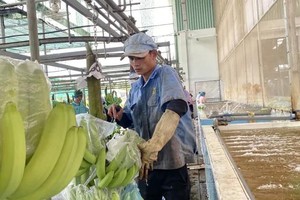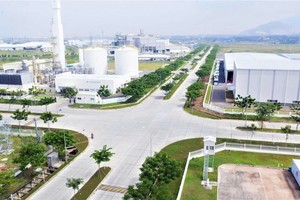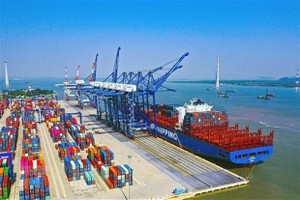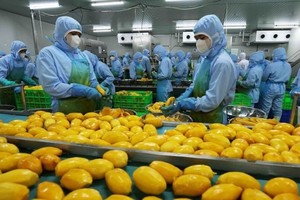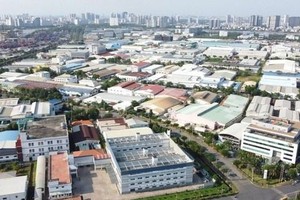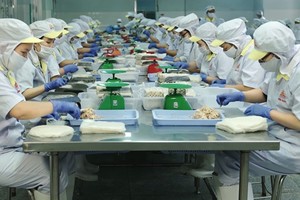
Due to the implementation of social distancing to prevent the spread of the pandemic, the total retail sales of goods and service revenue declined compared to the same period last year but retail sales still maintained steady purchasing power.
According to the Department of Industry and Trade of Ho Chi Minh City, the Covid-19 pandemic influenced the supply and prices of input materials for the production activities of enterprises, changed consumption habits, and affected the purchasing power, thereby swaying the situation of industrial production, trade, and import-export activities in the city in the first quarter of this year.
Particularly, in March this year, the index of industrial production (IIP) was estimated to increase by 3.4 percent compared to the previous month but decline 6.6 percent over the same period last year. In the first three months of this year, the IIP was estimated to drop by 1 percent over the same period last year. The processing and manufacturing industry suffered the greatest impact, estimated to decline by 1.7 percent. The four key industrial industries had the same results as those in the same period last year, 1 percentage point higher than the general index of the whole industrial industry. Of which, chemicals – rubber – plastic rose by 8 percent; electronics manufacturing surged by 11.5 percent; food, foodstuffs, and beverage processing industry slid by 5.4 percent; mechanical engineering plunged by 8.2 percent.
The department explained that the food, foodstuffs, and beverage processing industry posted a decrease mainly because the beverage manufacturing sector was estimated to fall by 8.9 percent with the production of beer bottles and cans slumping 15.9 percent year-on-year as consumers avoided going to public places and reduced spending, eating out, and traveling. Meanwhile, the demand for food and processed foods suddenly soared by 2-3 times higher after the 17th Covid-19 case, prompting enterprises to promote the production in March.
The pharmaceuticals – rubber industry also posted significant growth as enterprises in the industry boosted the production of antimicrobial solutions. Generally, the consumption index of the medicine, medicinal chemistry, and medicinal materials manufacturing sector was estimated to climb 19.8 percent; that of the chemicals and chemical product manufacturing sector was estimated to increase 20.6 percent over the same period last year.
The electronics manufacturing industry continued to perform the fastest growth rate among the four key industrial industries, thanks to plentiful orders. However, the increase was not as high as that in the same period last year because of the disruption in the global supply chain originating from the outbreak of the novel coronavirus in China, affecting the production of some key export products, including cell phones and electronic components, computers, and electronic devices.
The mechanical engineering industry slid due to a decrease in the number of orders in domestic and export markets. The automobile manufacturing industry was also affected because of a shortage of components and spare parts for the production.
The department said that despite the impacts of the Covid-19 pandemic, industrial production still managed to maintain growth rate, enterprises have been closely monitoring the market to put forward suitable short-term production plans.
Retail sales maintain stable growth
In the field of domestic trade, total retail sales of goods and consumer service revenue in March this year were estimated at nearly VND94.62 trillion, down 9.9 percent compared to the previous month and down 11.4 percent over the same period last year. Of which, retail sales of goods were estimated at above VND64.57 trillion, down 1.4 percent from the previous month, but up 4.9 percent compared to the same period last year.
In the first three months, total retail sales of goods and consumer service revenue were estimated at above VND316.9 trillion, down 1.7 percent. Of which, retail sales of goods were estimated at more than VND201.62 trillion, accounting for 63.6 percent of total retail sales and service revenue, up 8 percent over the same period last year. Food and foodstuffs accounted for 17.6 percent of retail sales, up 13 percent; garments and textiles accounted for 6.5 percent, up 6.6 percent; household appliances, tools, and equipment accounted for 19 percent, up 7.6 percent; gasoline accounted for 8.2 percent, up 4.6 percent.
In the context that revenue from other services, including accommodation and catering services, travel services, and other services, tended to decrease, the retail industry still maintained its growth rate higher than the overall growth rate of the whole service sector, thereby, contributing to economic stability and contributing to the trend of economic restructuring towards the service sector.
The department said that three factors contributed to the maintenance of growth rate of the retail sector in the first quarter of this year, including change in consumer behavior, in which, consumers adjusted their spending structure, focusing on buying essential goods, reducing shopping through markets and shopping centers, and increasing spending through supermarkets and online shopping; meeting the demand of consumers through a widespread distribution network with 238 markets, 202 supermarkets, 49 shopping malls, and 2,656 convenience stores; the supply capacity and commitment to fulfill the demand of enterprises in the city.
According to the reports by enterprises in the food industry and distribution networks, the raw material reserves are enough to maintain the production for at least the next three months; goods supply is plentiful and sufficient to ensure continuous and full supply in the next two or three months; the production of processed foods will ensure supply until the end of the second quarter of this year; many enterprises have had discount policies of 2-3 percent to support consumers during the pandemic. Enterprises have also pledged not to increase their prices and to be ready to provide goods 30-50 percent higher than the plan entrusted by the city, prioritize supplying goods for the domestic market, even halt export if necessary.
According to the Department of Industry and Trade of Ho Chi Minh City, the Covid-19 pandemic influenced the supply and prices of input materials for the production activities of enterprises, changed consumption habits, and affected the purchasing power, thereby swaying the situation of industrial production, trade, and import-export activities in the city in the first quarter of this year.
Particularly, in March this year, the index of industrial production (IIP) was estimated to increase by 3.4 percent compared to the previous month but decline 6.6 percent over the same period last year. In the first three months of this year, the IIP was estimated to drop by 1 percent over the same period last year. The processing and manufacturing industry suffered the greatest impact, estimated to decline by 1.7 percent. The four key industrial industries had the same results as those in the same period last year, 1 percentage point higher than the general index of the whole industrial industry. Of which, chemicals – rubber – plastic rose by 8 percent; electronics manufacturing surged by 11.5 percent; food, foodstuffs, and beverage processing industry slid by 5.4 percent; mechanical engineering plunged by 8.2 percent.
The department explained that the food, foodstuffs, and beverage processing industry posted a decrease mainly because the beverage manufacturing sector was estimated to fall by 8.9 percent with the production of beer bottles and cans slumping 15.9 percent year-on-year as consumers avoided going to public places and reduced spending, eating out, and traveling. Meanwhile, the demand for food and processed foods suddenly soared by 2-3 times higher after the 17th Covid-19 case, prompting enterprises to promote the production in March.
The pharmaceuticals – rubber industry also posted significant growth as enterprises in the industry boosted the production of antimicrobial solutions. Generally, the consumption index of the medicine, medicinal chemistry, and medicinal materials manufacturing sector was estimated to climb 19.8 percent; that of the chemicals and chemical product manufacturing sector was estimated to increase 20.6 percent over the same period last year.
The electronics manufacturing industry continued to perform the fastest growth rate among the four key industrial industries, thanks to plentiful orders. However, the increase was not as high as that in the same period last year because of the disruption in the global supply chain originating from the outbreak of the novel coronavirus in China, affecting the production of some key export products, including cell phones and electronic components, computers, and electronic devices.
The mechanical engineering industry slid due to a decrease in the number of orders in domestic and export markets. The automobile manufacturing industry was also affected because of a shortage of components and spare parts for the production.
The department said that despite the impacts of the Covid-19 pandemic, industrial production still managed to maintain growth rate, enterprises have been closely monitoring the market to put forward suitable short-term production plans.
Retail sales maintain stable growth
In the field of domestic trade, total retail sales of goods and consumer service revenue in March this year were estimated at nearly VND94.62 trillion, down 9.9 percent compared to the previous month and down 11.4 percent over the same period last year. Of which, retail sales of goods were estimated at above VND64.57 trillion, down 1.4 percent from the previous month, but up 4.9 percent compared to the same period last year.
In the first three months, total retail sales of goods and consumer service revenue were estimated at above VND316.9 trillion, down 1.7 percent. Of which, retail sales of goods were estimated at more than VND201.62 trillion, accounting for 63.6 percent of total retail sales and service revenue, up 8 percent over the same period last year. Food and foodstuffs accounted for 17.6 percent of retail sales, up 13 percent; garments and textiles accounted for 6.5 percent, up 6.6 percent; household appliances, tools, and equipment accounted for 19 percent, up 7.6 percent; gasoline accounted for 8.2 percent, up 4.6 percent.
In the context that revenue from other services, including accommodation and catering services, travel services, and other services, tended to decrease, the retail industry still maintained its growth rate higher than the overall growth rate of the whole service sector, thereby, contributing to economic stability and contributing to the trend of economic restructuring towards the service sector.
The department said that three factors contributed to the maintenance of growth rate of the retail sector in the first quarter of this year, including change in consumer behavior, in which, consumers adjusted their spending structure, focusing on buying essential goods, reducing shopping through markets and shopping centers, and increasing spending through supermarkets and online shopping; meeting the demand of consumers through a widespread distribution network with 238 markets, 202 supermarkets, 49 shopping malls, and 2,656 convenience stores; the supply capacity and commitment to fulfill the demand of enterprises in the city.
According to the reports by enterprises in the food industry and distribution networks, the raw material reserves are enough to maintain the production for at least the next three months; goods supply is plentiful and sufficient to ensure continuous and full supply in the next two or three months; the production of processed foods will ensure supply until the end of the second quarter of this year; many enterprises have had discount policies of 2-3 percent to support consumers during the pandemic. Enterprises have also pledged not to increase their prices and to be ready to provide goods 30-50 percent higher than the plan entrusted by the city, prioritize supplying goods for the domestic market, even halt export if necessary.
